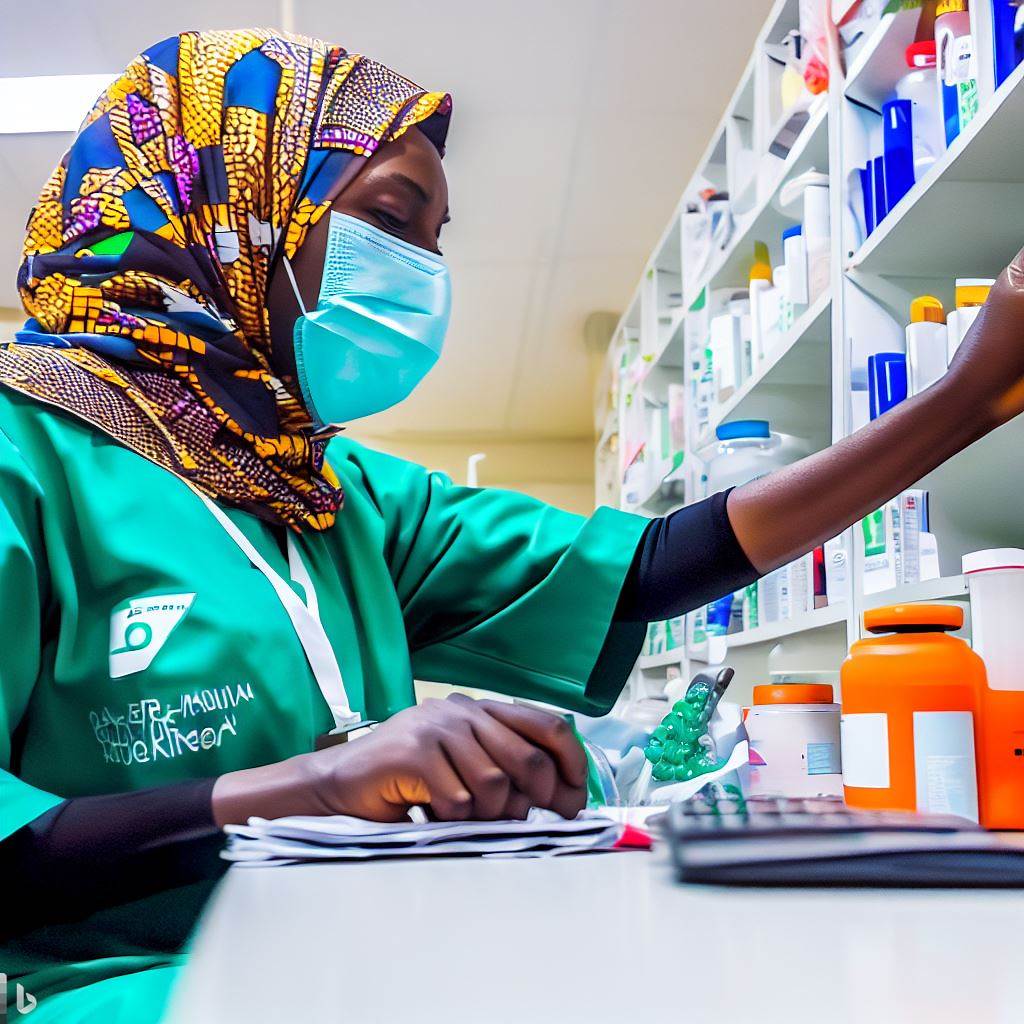Introduction
Phlebotomists play a crucial role in healthcare by collecting blood samples for testing. The Nigerian healthcare system faces various challenges, such as limited resources and insufficient staffing.
Addressing the impact of phlebotomists in Nigerian healthcare is essential for improved diagnostics and patient care. Hence, this article explores the profound impact of phlebotomists on Nigerian healthcare.
We will delve into their role in promoting early detection, disease monitoring, and the delivery of quality healthcare services. Join us as we celebrate the unsung heroes and champion the value of phlebotomists in shaping a healthier and brighter future for Nigerian healthcare.
Overview of the Nigerian Healthcare System
Nigeria’s healthcare infrastructure is characterized by inadequate facilities and poor quality services. The country has a shortage of healthcare professionals, including doctors and nurses.
Public hospitals often lack essential medical equipment and face challenges in maintaining basic hygiene standards.
The healthcare system is concentrated in urban areas, leaving rural communities with limited access to care. Limited government funding also further hampers the development of healthcare infrastructure.
The challenges and gaps in the system
The healthcare system faces a lack of primary healthcare services, leading to an increased burden on secondary and tertiary care facilities.
Accessibility and affordability of healthcare are major challenges for the majority of Nigerians. There is a significant disparity in healthcare services between urban and rural areas.
Additionally, inadequate health insurance coverage prevents many Nigerians from accessing necessary medical treatments. The brain drain of healthcare professionals to developed countries further exacerbates the challenges in the system.
The need for efficient healthcare services
Efficient healthcare services are essential for improving health outcomes and reducing mortality rates in Nigeria. Effective healthcare services can help detect and treat diseases early, leading to better prognosis and reduced healthcare costs.
Efficient healthcare delivery can also enhance patient satisfaction and overall healthcare experience. In addition, well-functioning healthcare services contribute to the overall economic development of the country.
Improved access to quality healthcare services is also crucial for achieving universal health coverage in Nigeria.
In short, the Nigerian healthcare system faces numerous challenges and gaps, including inadequate infrastructure, limited access to care, and a shortage of healthcare professionals.
Efficient healthcare services are necessary to bridge these gaps and provide adequate and affordable healthcare for all Nigerians.
Addressing these issues requires increased government funding, improved healthcare infrastructure, and policies to retain healthcare professionals. By prioritizing efficient healthcare services, Nigeria can improve health outcomes and create a healthier and more prosperous nation.
Read: Advancing Your Phlebotomy Career in Nigeria: Tips
The Role of Phlebotomists in Nigerian Healthcare
Phlebotomists and their specialization
Phlebotomists are medical professionals trained to draw blood from patients for various purposes. They specialize in venipuncture, which is the process of puncturing veins to collect samples.
Phlebotomists ensure proper handling and labeling of blood samples to maintain accuracy. They may also assist with other related tasks, such as preparing patients for blood tests.
The primary responsibilities and duties of phlebotomists
Phlebotomists must follow strict protocols to ensure patient safety during blood collection. They need to identify patients correctly and verify the requested tests before drawing blood.
Moreover, phlebotomists must maintain sterile equipment and dispose of used supplies properly. They are also responsible for labeling and recording collected samples accurately for further analysis.
The importance of phlebotomists in clinical laboratories and healthcare facilities
Phlebotomists are crucial for accurate diagnostic testing, as blood samples are often necessary for precise diagnoses.
They assist healthcare professionals in evaluating patients’ overall health and identifying underlying conditions. Their expertise ensures blood samples meet quality standards, providing reliable test results.
Additionally, phlebotomists contribute to patient satisfaction by offering a comfortable and efficient blood-drawing experience.
Efficiently performing their duties contributes to the smooth operation of healthcare facilities.
In Nigeria, phlebotomists play an essential role as they specialize in venipuncture, collecting blood samples for diagnostic purposes. These include:
Ensuring patient safety during blood collection is a primary responsibility. Following strict protocols, they properly identify patients, verify requested tests, and maintain sterile equipment while disposing of used supplies correctly to prevent infections.
Accurate labeling and recording of samples are crucial for reliable test results. Phlebotomists handle samples carefully, ensuring proper labeling to avoid mix-ups or errors, thus contributing to effective diagnostic testing.
Phlebotomists also provide necessary blood samples for various tests, enabling healthcare professionals to assess patients’ health, diagnose conditions, and monitor treatment effectiveness.
Without their expertise, accurate diagnosis and patient care would be compromised. Besides technical skills, phlebotomists prioritize patient satisfaction. They ease anxieties and ensure painless procedures, enhancing the overall healthcare experience.
Well-trained phlebotomists in healthcare facilities guarantee smooth laboratory services operation. They do this diligently adhering to protocols, maintaining quality standards, and handling samples accurately.
Overall, phlebotomists’ specialization in venipuncture and expertise in blood collection procedures are crucial for accurate diagnosis and patient care in Nigerian healthcare.
By following protocols, maintaining quality, and ensuring patient comfort, phlebotomists contribute to efficient healthcare facilities.
Read: Impact of Technology on Optometry Practice in Nigeria
Contributions of Phlebotomists to Nigerian Healthcare
Importance of Phlebotomists in Accurate Diagnosis and Monitoring of Diseases
Phlebotomists play a vital role in the accurate diagnosis of diseases through blood sample collection. They ensure that proper samples are collected, labeled, and handled correctly to maintain their integrity.
By following strict procedures, phlebotomists minimize the risk of contamination or erroneous results. Accurate diagnosis is crucial for initiating appropriate treatment plans and saving lives.
Phlebotomists’ expertise in drawing blood helps healthcare professionals detect various diseases and conditions. They collect samples for laboratory testing, enabling healthcare providers to make accurate and timely diagnoses.
Phlebotomists’ attention to detail ensures that patients receive the correct tests and appropriate treatments. Without their contribution, the accuracy of diagnoses would be compromised, leading to potential medical errors.
Regular monitoring of diseases, such as diabetes and cancer, relies on phlebotomists’ proficiency in blood collection. Phlebotomists ensure patients’ blood samples are collected at specific intervals to track disease progression or response to treatment.
Role of Phlebotomists in Patient Care and Comfort During Blood Collection
Phlebotomists play a crucial role in patient care by providing a comfortable and reassuring experience during blood collection. They use their communication skills to alleviate patients’ fears and anxieties related to the procedure.
Phlebotomists create a safe and supportive environment, building trust with patients. They ensure that patients are well-informed about the process and answer any questions or concerns.
By identifying patients’ needs and providing personalized care, phlebotomists contribute to overall patient satisfaction. They prioritize patients’ comfort, utilizing techniques to minimize pain and discomfort during blood collection.
Phlebotomists’ empathy and calm demeanor help patients feel at ease, fostering a positive healthcare experience.
Furthermore, their ability to handle challenging situations and difficult veins ensures successful blood draws. Creating a positive patient-phlebotomist relationship leads to increased compliance and better healthcare outcomes.
Phlebotomists’ role extends beyond drawing blood, as they provide emotional support and comfort to patients.
Contribution of Phlebotomists to Overall Patient Satisfaction
Phlebotomists significantly contribute to overall patient satisfaction within the Nigerian healthcare system. Patients appreciate their professionalism, courtesy, and dedication to providing high-quality care.
By delivering accurate and reliable results, phlebotomists contribute to patients’ trust in the healthcare system. Effective communication skills ensure that patients feel heard, valued, and involved in their healthcare journey.
Phlebotomists’ efficiency and adherence to proper protocols minimize wait times, enhancing patient satisfaction. They strive to create a positive and welcoming atmosphere, which improves patients’ overall healthcare experience.
Furthermore, phlebotomists’ role in preventing needles and equipment-related infections boosts patient confidence. Their commitment to maintaining a sterile environment ensures patient safety and reduces the risk of complications.
Phlebotomists’ contribution to overall patient satisfaction reinforces the importance of their role in Nigerian healthcare. Through their professionalism, expertise, and compassionate care, phlebotomists leave a lasting impact on patients.
Generally, phlebotomists in Nigerian healthcare make invaluable contributions to accurate diagnosis, disease monitoring, patient care, and overall patient satisfaction.
Their expertise in blood sample collection ensures accurate results, aids in disease detection, and supports timely treatments.
Furthermore, their dedication to patient comfort and emotional support enhances patients’ healthcare experience. Phlebotomists play a pivotal role in building patient trust and satisfaction, reinforcing the significance of their contributions to Nigerian healthcare.
Read: Continuing Education for Phlebotomists in Nigeria

Challenges Faced by Phlebotomists in Nigerian Healthcare
In Nigerian healthcare, phlebotomists face several challenges that hinder their ability to provide quality care.
Lack of Standardized Training and Certification Programs
One major challenge is the absence of standardized training programs. Currently, there is no consistent curriculum for phlebotomy education in Nigeria.
This lack of uniformity makes it difficult to ensure that phlebotomists possess the necessary skills and knowledge to perform their duties effectively.
Without standardized training, there is a risk of inconsistencies in phlebotomy practices and a potential compromise in patient safety.
Shortage of Phlebotomists and High Patient-to-Staff Ratios
Another significant challenge is the shortage of phlebotomists in Nigeria. This shortage leads to high patient-to-staff ratios, increasing the workload for each phlebotomist.
With limited resources, phlebotomists may struggle to provide timely and accurate services to all patients.
Long waiting times and delays can lead to frustration among both patients and healthcare professionals, impacting the overall quality of care provided.
Inadequate Resources and Equipment for Phlebotomy Procedures
Phlebotomy procedures require specific resources and equipment to be performed accurately and safely.
However, in Nigeria, phlebotomists often face a shortage of essential materials, such as collection tubes, needles, and gloves.
The lack of proper equipment not only affects the efficiency of phlebotomy procedures but also poses risks to both patients and phlebotomists. This challenge further hampers the ability to provide quality healthcare services.
In a nutshell, the challenges faced by phlebotomists in Nigerian healthcare are significant and multifaceted.
The lack of standardized training and certification programs, the shortage of phlebotomists, and the inadequate resources and equipment all contribute to the difficulties faced by these healthcare professionals.
Addressing these challenges is crucial for improving the quality and efficiency of phlebotomy services in Nigeria and ultimately enhancing the overall healthcare system.
Read: Day in the Life: What It’s Like Being an Optometrist in Nigeria
Improving the Impact of Phlebotomists on Nigerian Healthcare
The development of standardized training and certification programs
Implementing standardized training programs will ensure consistent quality of phlebotomy services. Certification programs can validate the knowledge and skills of phlebotomists, boosting their credibility.
Nigerian healthcare authorities, like the Federal Ministry of Health, should collaborate with institutions to establish these programs. Standardized training will address inconsistencies in techniques, reducing the risk of errors and infections.
Adhering to international standards will enhance the reputation of Nigerian phlebotomists globally. Moreover, continuous professional development programs should be implemented to keep phlebotomists up-to-date with evolving practices.
The need for increased investment in phlebotomy education and infrastructure
Insufficient funding has hampered the growth of phlebotomy education and infrastructure in Nigeria.
Increased investment will improve the availability and accessibility of phlebotomy training programs. Hence, the government should allocate more funds to the establishment of phlebotomy training centers.
State-of-the-art laboratories and equipment are essential for comprehensive phlebotomy education. Collaborations with healthcare organizations can enhance the reach and impact of training initiatives.
Investing in infrastructure will ensure phlebotomists have the necessary tools to perform their duties effectively.
The importance of empowering and supporting phlebotomists
Creating a supportive and inclusive environment will motivate phlebotomists to excel in their profession. This can be done in the following ways:
- Recognize the crucial role phlebotomists play in diagnostic procedures and patient care.
- Encourage public recognition and appreciation for the contributions of phlebotomists.
- Provide opportunities for career advancement and professional growth for phlebotomists.
- Establish peer support networks to foster collaboration and knowledge sharing among phlebotomists.
- Mentorship programs can provide guidance and expertise to new and aspiring phlebotomists.
By advocating for standardized training, increased investment in education and infrastructure, and empowering phlebotomists, Nigerian healthcare can benefit immensely.
These measures will enhance the quality and reliability of phlebotomy services, ultimately improving patient outcomes and healthcare delivery as a whole.
Case Study: Successful Integration of Phlebotomists in Nigerian Healthcare
Real-Life Example: St. Mary’s Hospital, Lagos
St. Mary’s Hospital, Lagos, effectively employs phlebotomists in its healthcare system. Trained professionals skillfully draw blood, enhancing overall patient care.
Their streamlined processes ensure faster turnaround time for test results. This reduced wait times result in improved patient satisfaction and increased trust.
Positive Impact on Healthcare Delivery and Patient Outcomes
Enhanced efficiency in blood collection minimizes patient discomfort. Accurate and timely lab tests aid in swift diagnosis and treatment.
Lowered risk of sample contamination leads to more reliable results. Phlebotomists collaborate with medical teams, fostering holistic patient care.
A Model for Improving Phlebotomy Practices in Nigeria
St. Mary’s case study highlights the value of specialized phlebotomy training. Implementing dedicated phlebotomy teams can optimize resource allocation.
Other Nigerian hospitals can adopt similar integrated phlebotomy programs. This approach positively impacts patient satisfaction, care quality, and treatment outcomes.
Overall, St. Mary’s Hospital exemplifies the successful integration of phlebotomists in Nigerian healthcare. By employing these specialized professionals, they have not only improved the efficiency of blood collection but also enhanced patient outcomes.
This case study serves as a model for other healthcare facilities in Nigeria to enhance their phlebotomy practices, ultimately leading to a more effective and patient-centric healthcare system.
Conclusion
Phlebotomists in Nigerian healthcare play a crucial role in providing accurate diagnostics, disease monitoring, and overall patient care.
Despite facing challenges, such as the lack of standardized training, shortages of staff and resources, and inadequate infrastructure, phlebotomists remain dedicated to delivering high-quality services.
To improve the impact of phlebotomists in Nigerian healthcare, it is essential to establish standardized training and certification programs.
Increased investment in education and infrastructure will enhance the availability and accessibility of phlebotomy training while empowering and supporting phlebotomists will foster a positive and inclusive environment for their growth.
By following successful examples like St. Mary’s Hospital in Lagos, Nigerian healthcare facilities can integrate specialized phlebotomy teams to optimize resource allocation, improve patient outcomes, and elevate the overall quality of healthcare services.
As we celebrate the unsung heroes of phlebotomy in Nigeria, let us continue to advocate for their recognition and support to ensure a healthier and brighter future for the nation’s healthcare.




